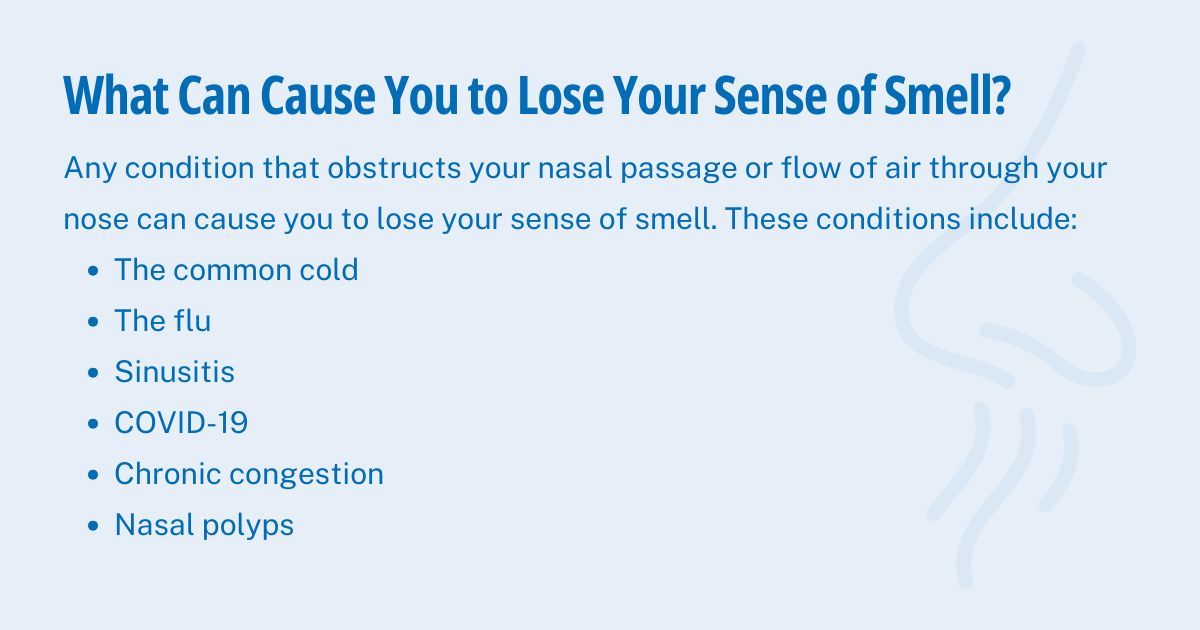5 Reasons Why You May Have a Loss of Taste and Smell With Flu
Updated: May 2023
Have you ever experienced a loss of taste and smell with the flu? If so, you’re not alone. It’s a common symptom of the flu and can be quite frustrating.
But have you ever wondered why your taste and smell are affected by influenza? We’ll explore 5 ways that the flu can change the way you taste and smell.
5 Reasons Why You May Have a Loss of Taste and Smell With Flu
First, it’s important to realize that your senses of taste and sense of smell are closely linked. We’ll go into this in detail a bit later in the article, but essentially, if your sense of smell diminishes, you’ll likely find that your food is bland or tasteless.
The medical term for losing your sense of smell is known as anosmia.
Here are five reasons why you can have a loss of taste and smell with the flu:
1. Inflammation in Your Sinuses
Sinus inflammation, also known as sinusitis, can have a significant impact on your sense of smell.
The inflammation causes the sinuses to become congested and swollen, which can lead to a blockage of the nasal passages. As a result, the ability to detect smells is often compromised, as the odor molecules cannot reach the olfactory (scent) receptors located at the top of the nose.
2. Nasal Congestion
Additionally, the inflammation can also cause the mucus membranes that line the nasal passages to produce excess mucus, which can further impair the sense of taste and smell with the flu.
In some cases, sinusitis can even lead to a complete loss of the sense of smell. It is important to seek medical attention from one of our ear, nose, and throat doctors in Raleigh if sinus inflammation is suspected, as prompt treatment can help to alleviate symptoms and restore normal olfactory function.
3. Swollen Taste Buds
Swollen taste buds, also known as papillitis, can significantly impact your sense of taste.
The taste buds are small, mushroom-shaped structures located on the tongue, and they contain the receptors that allow us to detect the five basic tastes: sweet, sour, salty, bitter, and umami.
When the taste buds become inflamed or swollen, it can disrupt their normal function and alter our perception of taste. This can result in a decreased ability to taste certain flavors or a distortion of taste, such as a metallic or bitter taste. It’s also one of the factors that contribute to a loss of taste and smell with the flu.
4. Dehydration
When you have the flu, it’s important to stay hydrated. However, if you’re not drinking enough fluids, it can affect your sense of taste. Dehydration can make your mouth and tongue feel dry, which can affect your ability to taste. This is one of the more overlooked reasons for loss of taste and smell with the flu.
When you are dehydrated, your body produces less saliva, which can cause the mouth to feel dry and lead to a decreased ability to taste food properly. In addition, dehydration can cause a thickening of the mucus in the nose, making it more difficult for odor molecules to reach the olfactory receptors.
The combination of decreased taste and smell can result in a loss of enjoyment of food and beverages and can even contribute to a decrease in appetite.
5. Side Effects of Medication
Cold and flu medications can sometimes lead to a loss of taste or smell with the flu, as these medications may dry out the nasal passages and mucous membranes.
Additionally, some medications, particularly those containing some older antihistamines, can interfere with the ability of the olfactory receptors in the nose to detect and process odor molecules, resulting in a temporary loss of smell.
While the effects of these medications are usually temporary and wear off once the medication is discontinued, it is important to talk to us if you experience any prolonged or concerning changes in your sense of taste or smell.
Overall, the flu can affect your sense of smell and taste. If you’re experiencing a loss of taste and smell, it’s important to stay hydrated and talk to your doctor about any medication side effects. With some time and rest, your sense of taste and smell will often return to normal.
Can The Flu Permanently Damage Your Sense of Smell?
We’ve already discussed the loss of taste and smell with the flu, along with their common causes.
But is this loss of smell permanent?
The flu can damage your sense of smell. Fortunately, this is usually not permanent, though it may take a while to return.
Often, whether or not you regain your sense of smell depends upon the underlying cause. If extensive damage is done to your nasal nerves, it is more likely that the condition will be permanent.
Typically, anosmia (loss of the sense of smell) is not an indicator of a serious condition. However, because the sense of taste and sense of smell are closely related, anosmia may mean that you lose interest in eating, and as a result, lose too much weight. Therefore, you fail to get the important nutrients your body needs.
The National Institutes of Health states that anosmia affects 3 percent of the adult population over the age of 40, and the incidence increases with age. For those over 60 years of age, the rate rises to as much as 22 percent.
What Conditions Can Cause Loss of Smell?
While it’s not unusual to have a loss of taste and smell with the flu, there are also a lot of other conditions that can affect it as well.

Some neurological conditions can cause anosmia. Although uncommon, the olfactory center of the brain—the part used for processing the sense of smell— can be damaged by:
- Alzheimer’s disease
- A brain tumor
- Head injury
- Diabetes
- Exposure to harmful chemicals such as insecticides
- Certain medications
- Zinc-containing nasal sprays (these have been taken off the market)
When Will I Regain My Sense of Smell?
We have ear, nose, and throat doctors who have extensive expertise and can implement a plan to help you. The course of care depends upon the underlying cause.
For example, if your problem is caused by chronic sinus infections, then we will create a treatment plan to help you.
In cases like this, your sense of smell should return at some point after the underlying problem is resolved. Sometimes, this may involve sinus surgery.
Conclusion:
There are several reasons why you may experience a loss of taste and smell with the flu. These reasons range from sinus inflammation to dehydration.
Loss of smell due to an acute condition is not likely to be permanent. Your sense of smell should gradually return. However, anosmia due to a neurological problem with your brain makes it difficult to predict when or if you will be able to smell again.
Raleigh Capitol ENT Will Help You Treat Loss of Taste and Smell With Flu
There are many potential causes for anosmia. That’s why it’s important to have an experienced, innovative healthcare team on your side. We’ve been the provider of choice for the Raleigh, Durham, and Cary areas for decades. Our board-certified physicians are well-versed in the most recent treatments.
Whether your sense of smell has been damaged by a nose injury, the flu, or chronic rhinosinusitis, we’re here to help you. Please contact us to schedule an appointment.




